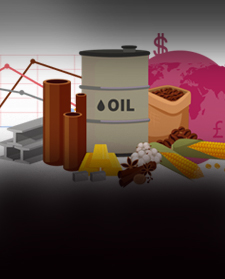
Advantage AxisDirect
- 20 investment products
- 3 great platforms to invest
- 5 fun-tastic learn courses
- 5 powerful research segments
- 4 prestigious awards
- 9 lakh+ happy investors
Quotes
Back To Menu
-
Offerings
- Overview
- Products
- Platforms - RING
- DIGITAX
- Managed Accounts
- Private Client Group
- Business Associates
- NRI
- REFER & EARN
- Insurance
- SGB
- Markets
- Research
- Learn
- PORTFOLIO
- PROFILE
What you need to know before dipping your toes in the Indian commodity market
Sep 22, 2022

Commodity trading involves buying and selling a broad range of assets like oil and gas, metals such as gold and silver, and agricultural commodities like cocoa, coffee, wheat, and sugar. However, the energy markets, including oil and gas trading, and metal markets, including gold and silver are gradually gaining popularity.
The way of trading commodity markets is just like trading equities and other instruments in securities markets. But there are several factors that you need to know before entering commodities trading.
Some of the essential points while investing in commodities markets are:
1. If you are new to trading, you should focus on contracts such as bullion and oil. Liquid contracts are easy to understand and trade. Advantage of the liquid contract is the lower bid or ask spreads that minimize price slippage at entry and exit, thus increasing the chances of profit.
2. Secondly, investors should ensure they are winding up their positions before they expire. If you don’t want to opt for physical delivery, you need to square off the position or roll over to the next contract.
Types of Commodities traded in India
We can classify the commodities into two types- Hard and Soft. Hard commodities are extracted from the Earth. Metals and minerals, like gold, silver, copper, and even crude oil are considered hard commodities. On the other hand, soft commodities are primarily food grains, edible oil, meat, and livestock.
As commodity trade in India is conducted through exchanges, each exchange allows only certain commodities to be traded. For example, if you want to trade in energy, you can only do so on the Multi Commodity Exchange.
List of Commodities traded in India
There are broadly four categories of commodity futures that are traded in India.
Base Metals or Industrial Metals: This category includes futures contracts on copper, Nickel, lead ,zinc, and aluminum commodity exchanges. These contracts are also quite liquid, and MCX has a dominant position in futures and options on these base or industrial metals.
Precious metals: This category includes futures contracts on gold and silver on the commodity exchanges. Gold and silver contracts are the most liquid contracts in the exchanges, and MCX is the leader in futures and options trading on precious metals.
Agriculture commodities: This category includes essential cash crops like guar ,Jeera, daniya etc. These contracts are also highly liquid, and NCDEX has a dominant position in these agricultural commodities' futures and options.
Energy Commodities: This category includes crude oil and natural gas. In India, these commodities are traded in smaller contracts compared to international standards. These are cash-settled contracts with no physical delivery due to logistical bottlenecks.
The Ministry of Finance has banned several agricultural commodities from trading in futures and options in India due to fears over unnecessary speculation and inflation. These commodities are wheat, paddy (non-basmati), mustard seeds, chana, soya bean, crude palm oil and moong.
Regulation of commodity trading in India
Before dipping your toes in the Indian commodity market, it is crucial to understand its regulatory landscape thoroughly.
In India, the Forward Market Commission or FMC regulated the commodities market until 2015. The National Spot Exchange (NSEL) scam in 2013, caused a significant upheaval in the functioning and regulation of the FMC. As a result, the commodity futures market’s regulation was entrusted with the SEBI.
Since 2015, the Securities and Exchange Board of India (SEBI) has regulated the commodity markets. Commodity trading in these exchanges is subject to standard agreements as per the instructions to facilitate trade execution without visual inspection. As a practice for any futures exchange, commodity futures exchanges' trades are standardized on quality parameters, lot sizes, delivery dates, expiry, etc. for streamlined entry and exit.In 2017, the trading in commodity options was introduced, but it is yet to gain momentum, although an uptick can be seen in several commodities. In India, the volumes on options are predominantly on options on commodity futures instead of spot commodities.
To activate your commodity segment on Axis Direct, log on to: Activate Derivatives
Related Keyword
MCX
NCDEX
commodities
Similar Articles

Inflexion Point: Concept In Commodities Market | Commodity Derivatives – Axis Direct
Dec 05, 2018 | Source: www.thehindubusinessline.com

A Millennial’s Guide To Commodity Derivatives – Axis Direct
May 10, 2019 | Source: www.moneycontrol.com
Show more...




 India
India NRI
NRI

